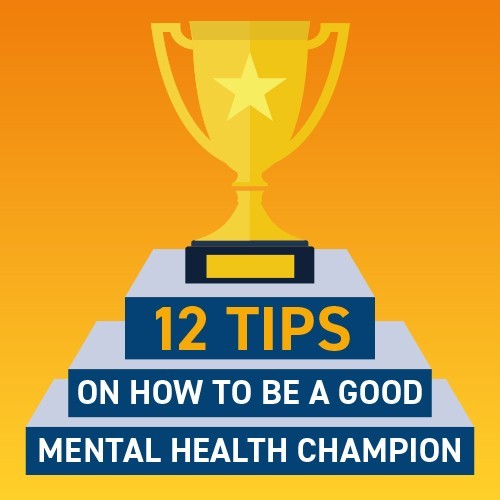How to be a good mental health champion

A good mental health champion can help employees find the best of themselves.
How to be a good mental health champion
1. BE SOMEONE EMPLOYEES CAN TRUST
Workplace relationships can be complicated, and for someone experiencing mental health difficulties, it can be difficult to know who to turn to. A good mental health champion will let all staff know there is someone there for them if they need.
2. BE PASSIONATE
Understanding and supporting mental health takes time and energy, so you need to be passionate about effecting change and making a difference.
3. SUPPORT COLLEAGUES IN BRINGING THEIR WHOLE SELVES TO WORK
If staff are functioning at a fraction of their capability due to mental stress, that’s no good for the individual or the organisation. A good mental health champion can help employees find the best of themselves.
4. KNOW WHAT SUPPORT IS AVAILABLE
A big part of the role is signposting people to appropriate help. Does your organisation have an employee assistance programme (EAP) or private health insurance? Could someone access help from their GP, a charity such as Mind, or support services dealing with issues such as addiction or an eating disorder? And what support is available for you as a champion?
5. LEAD BY EXAMPLE
It’s all very well telling people to take regular breaks, but who wants to be the only one? A mental health champion can set an example with their own behaviour and promote a healthy working culture.
6. BE A VOICE FOR MENTAL WELLBEING
In a busy work environment, it can be easy for good mental health to slip down the list of priorities. Someone needs to make the case for healthy working practices and represent colleagues facing challenges. Tackle the stigma around the issue. We can’t address mental health if we don’t talk about it, and a mental health champion can open up conversations.
7. MANAGE YOUR TIME
Managing a mental health champion’s diary takes a significant chunk of staff time. You need to balance this with the day-to-day workload, which needs to be reduced accordingly. Don’t let the role take over lunch breaks and time after work.
8. BE SELF-AWARE
The role can be emotionally challenging, so it’s important to for champions to take care of themselves too. Pay attention to your own thoughts and noticing how they affect your mood, perception and decision-making.
9. BE OBSERVANT AND INTUITIVE
People struggling with their mental health aren’t necessarily going to advertise their issues. The signs can be subtle, and it can take an observant person to pick up on when something’s not right.
10. DON’T MAKE ASSUMPTIONS
Being a mental health champion means helping people address their issues on their own terms. Your perception of an issue might be quite different to someone else’s experience. Approach each situation with an open mind and try to find out what it means to the person you’re trying to help.
11. KEEP TRAINING
Mental health champions need to have the confidence, skills and knowledge to develop into their role. There are various training courses to help with this, and training should be ongoing.
12. SET BOUNDARIES
It’s difficult to help others with their mental health if you’re not in a good place yourself. This means being able to switch off from the role, and avoid taking people’s issues home with you. You need to find a way to maintain your boundaries and safeguard your own mental health.
To find out more about how we can support positive mental health in your workplace get in touch.







